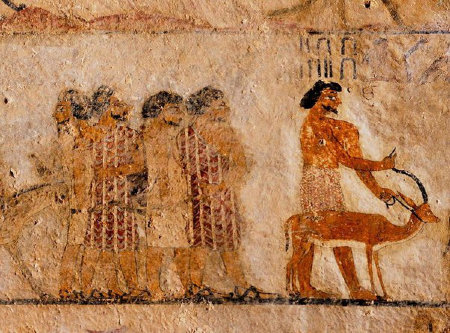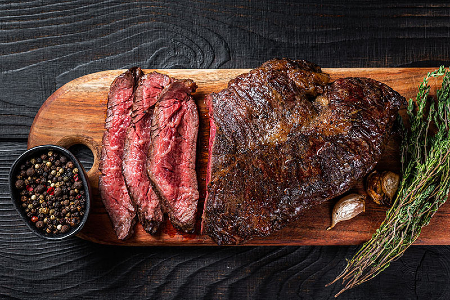We ask you, humbly: don't scroll away.
Hi readers, it seems you use Catholic Online a lot; that's great! It's a little awkward to ask, but we need your help. If you have already donated, we sincerely thank you. We're not salespeople, but we depend on donations averaging $14.76 and fewer than 1% of readers give. If you donate just $5.00, the price of your coffee, Catholic Online School could keep thriving. Thank you.Help Now >
Desert (in the Bible)
FREE Catholic Classes
The Hebrew words translated in the Douay Version of the Bible by "desert" or "wilderness", and usually rendered by the Vulgate desertum , "solitude", or occasionally eremus , have not the same shade of meaning as the English word desert. The word wilderness , which is more frequently used than desert of the region of the Exodus, more nearly approaches the meaning of the Hebrew, though not quite expressing it. When we speak of the desert our thoughts are naturally borne to such places as the Sahara, a great sandy waste, incapable of vegetation, impossible as a dwelling-place for men, and where no human being is found except when hurrying through as quickly as he can. No such ideas are attached to the Hebrew words for desert. Four words are chiefly used in Hebrew to express the idea :
(1) Midbar
The more general word. It is from the root dabar , "to lead" (cattle to pasture) [cf. German Trift from treiben ]. Hence midbar among its other meanings has that of tracts of pasturage for flocks. So Joel, ii, 22: "The beautiful places of the wilderness are sprung", or literally: "The pastures of the wilderness shoot forth". So, too, the desert was not necessarily uninhabited. Thus ( Isaiah 42:11 ) we read: "Let the desert ( midbar ) and the cities thereof be exalted: Cedar shall dwell in houses", or rather, "the villages that Cedar doth inhabit". Not that there were towns in the desert occupied by a stable population. The inhabitants were mostly nomads. For the desert was not a place regularly cultivated like the fields and gardens of ordinary civilized districts. Rather, it was a region in which was to be found pasturage, not rich, but sufficient for sheep and goats, and more abundant after the rainy season. The desert, too, was looked upon as the abode of wild beasts — lions (Ecclus., xiii, 23), wild asses ( Job 24:5 ), jackals ( Malachi 1:3 ), etc. It was not fertilized by streams of water, but springs were to be found there ( Genesis 16:7 ), and in places cisterns to collect the rainfall. Midbar is the word generally used in the Pentateuch for the desert of the Exodus; but of the regions of the Exodus various districts are distinguished as the desert of Sin ( Exodus 16:1 ), the desert of Sinai ( Exodus 19:1 ), the desert of Sur ( Exodus 15:22 ), the desert of Sin ( zin ) ( Numbers 13:22 ), etc. Moreover, it is used of other districts, as in Western Palestine of the wilderness of Juda ( Judges 1:16 ), and again in the east of the desert of Moab ( Deuteronomy 2:8 ).
(2) `Arabah
`Arabah , derived from the root 'arab , "to be arid", is another word for desert, which seems to express more than one of its natural characteristics. The word means a steppe, a desert plain; and it conveys the idea of a stretch of country, arid, unproductive, and desolate. In poetic passages it is used in parallelism with the word midbar . Thus Is., xxxv, 1: "The land that was desolate [ midbar ] and impassable shall be glad, and the wilderness [ 'arabah ] shall rejoice"; cf. also Jer., xvii, 6, etc. Although the Septuagint frequently renders the word by eremos , it often uses other translations, as ge dipsosa and elos . The Vulgate employs the words solitudo , desertum . Very frequently the word 'arabah has a mere geographical sense. Thus it refers to the strange depression extending from the base of Mount Hermon , through the Jordan Valley and the Dead Sea, to the Gulf of Akabah. So, too, there are the Arboth Moab ( Numbers 22:1 ), the Arboth Jericho ( Joshua 4:13 ), etc., referring to the desolate districts connected with these places.
(3) Horbah
Horbah , derived from the root harab , "to lie waste", is translated in the Septuagint by the words eremos, eremosis, eremia . In the Vulgate are found the renderings ruinœ, solitudo, desolatio . A strange translation occurs in Ps. ci, 7. The word in the Greek is oikopedon and in the Vulgate domicilium; and the passage in which the word occurs is rendered in the Douay version : "I am like a night raven in the house ". St. Jerome , however, in his translation of the Psalm direct from the Hebrew employs the word solitudinum , which seems more correct: "I am like a night raven of the wastes". The lexicon of Gesenius gives as the first meaning of horbah , "dryness"; then as a second meaning, "a desolation", "ruins". A combination of these senses seems to have been the reason why in the poetical books the word is used of the wilderness. The word conveys the idea of ruin or desolation caused by hostile lands, as when God says to Jerusalem (Es., v, 14): "I will make thee desolate "; or when the Psalmist, referring to the punishment inflicted by Jehovah, says ( Psalm 9:7 ): "The enemy are consumed, left desolate for ever".
(4) Jeshimon
Jeshimon , derived from jasham , "to be desolate". It was looked upon as a place without water, thus Is., xliii, 19: "Behold I shall set up streams in the desert [ jeshimon ]". It was a waste, a wilderness. In poetical passages it is used as a parallel to midbar , cf. Deut., xxxii, 10; Ps., lxxviii, 40 (Heb.): "How often did ye provoke him in the wilderness [ midbar ], and grieve him in the desert [ jeshimon ]?" Frequently it is used of the wilderness of the Exodus. Besides such uses of the word, it seems when used with the article often to have assumed the force of a proper name. In such cases it refers at times to the wilderness of the Exodus (cf. Psalm 78:40 ; 106:14 — Heb.; etc.). Parts of the waste region about the Dead Sea are called the jeshimon ; and to the north-east of the same sea there is a place called Beth-Jeshimoth (cf. Numbers 33:49 ), where the Israelites are said to have encamped at the end of the wanderings. These are the principal words used for desert in the Bible . There are, however, others less frequently used, only one or two of which can be mentioned here: such as tohu , used in Gen., i, 2: "the earth was void ". In Deut., xxxii, 10, it is used in parallelism with midbar , and in Ps. cvii, 40 it refers to the desert directly. Such also is çiyyah , which means, literally, dryness, but refers at times to the desert: so, 'areç çiyyah , "a land of drought", or "a desert" ( Hosea 2:5 ).
Biblical deserts
A word may be said here concerning the chief deserts referred to in the Bible . Perhaps the most interesting is that of Exodus. In the Pentateuch this tract is treated as a whole as "the desert", but, as a rule, special parts of it are referred to, as the desert of Sin, the desert of Sinai, the desert of Cades, the desert of Pharan, etc. Books have been written to discuss the geography of this region. Suffice it to say that it comprises the ground over which the Israelites travelled from their crossing of the Red Sea till their arrival in the Promised Land. We do not enter into the question raised by modern critics as to whether the geography of the Exodus had different meanings in different parts of the Pentateuch. The desert of Juda, too, plays an important part in the Bible . It lies to the west of the 'arabah , the Jordan, and the Dead Sea. To it belong the deserts of Engaddi, that of Thecua, and that of Jericho, near the city of the same name. To the east of Palestine are the deserts of Arabia, Moab, and the desert of Idumea, near the Dead Sea. We are told ( Exodus 3:1 ) that Moses fed the flocks of Jethro, and led them to the interior parts of the desert. This desert was in the land of Madian, close to the Red Sea, and in it was Mount Horeb, which St. Jerome says was the same as Sinai. The desert to which David fled from Saul (cf. 1 Samuel 23:14 ) was the desert of Ziph, which lies south of the Dead Sea and Hebron. John the Baptist lived and taught in the desert of Judea, west of the Jordan and the Dead Sea, near Jericho. Finally, the scene of Christ's temptation ( Matthew 4:1-11 ), of which St. Mark adds (i, 13): "He was with wild beasts", was most likely in the 'arabah to the west of the Jordan. But this is only speculation.
Join the Movement
When you sign up below, you don't just join an email list - you're joining an entire movement for Free world class Catholic education.
-

-
Mysteries of the Rosary
-
St. Faustina Kowalska
-
Litany of the Blessed Virgin Mary
-
Saint of the Day for Wednesday, Oct 4th, 2023
-
Popular Saints
-
St. Francis of Assisi
-
Bible
-
Female / Women Saints
-
7 Morning Prayers you need to get your day started with God
-
Litany of the Blessed Virgin Mary
Biblical Lost Alphabet Traced Back to Ancient Canaanite Civilization
-

What are the Health Benefits of Grass-Fed Beef for Your Body and Mind?
-

Rise Above Poverty is Empowering Children and Families Through Education and Compassion
-
Artists and Leaders Rally to Preserve the Traditional Latin Mass
-
Republicans Demand Answers Over Army Training Slide Labeling Pro-Life Groups as Terrorist Threats
Daily Catholic
 Daily Readings for Wednesday, July 24, 2024
Daily Readings for Wednesday, July 24, 2024 St. John Boste: Saint of the Day for Wednesday, July 24, 2024
St. John Boste: Saint of the Day for Wednesday, July 24, 2024 Prayer for Travelers: Prayer of the Day for Wednesday, July 24, 2024
Prayer for Travelers: Prayer of the Day for Wednesday, July 24, 2024- Daily Readings for Tuesday, July 23, 2024
- St. Bridget of Sweden: Saint of the Day for Tuesday, July 23, 2024
- A Child's Prayer to Mary: Prayer of the Day for Tuesday, July 23, 2024
![]()
Copyright 2024 Catholic Online. All materials contained on this site, whether written, audible or visual are the exclusive property of Catholic Online and are protected under U.S. and International copyright laws, © Copyright 2024 Catholic Online. Any unauthorized use, without prior written consent of Catholic Online is strictly forbidden and prohibited.
Catholic Online is a Project of Your Catholic Voice Foundation, a Not-for-Profit Corporation. Your Catholic Voice Foundation has been granted a recognition of tax exemption under Section 501(c)(3) of the Internal Revenue Code. Federal Tax Identification Number: 81-0596847. Your gift is tax-deductible as allowed by law.










 Daily Readings for Wednesday, July 24, 2024
Daily Readings for Wednesday, July 24, 2024 St. John Boste: Saint of the Day for Wednesday, July 24, 2024
St. John Boste: Saint of the Day for Wednesday, July 24, 2024 Prayer for Travelers: Prayer of the Day for Wednesday, July 24, 2024
Prayer for Travelers: Prayer of the Day for Wednesday, July 24, 2024

